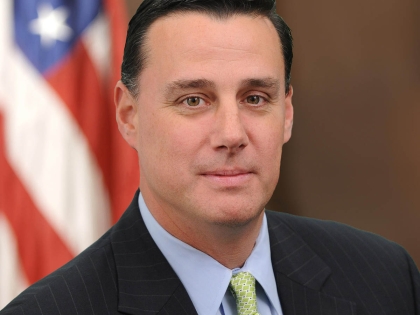
Senator Palumbo Teams Up with Suffolk County District Attorney Ray Tierney to Promote Legislation Designed to Combat the Fentanyl Crisis
January 8, 2024

Rally to Fight Fentanyl Crisis
New York State Senator Anthony Palumbo (R,C-New Suffolk) today joined Suffolk County District Attorney Ray Tierney, Nassau County District Attorney Anne Donnelly, Senate and Assembly colleagues, members of Suffolk County law enforcement, labor unions, community activists and crime victims advocates, including Gene and Sue Murray who lost their daughter, Chelsey, to a fatal fentanyl overdose in Suffolk County in 2022, to promote a bipartisan legislative package designed to combat the fentanyl epidemic.
The bills would seek to address the state’s drug overdose crisis by charging suppliers of drugs that cause fatalities with manslaughter (Chelsey’s Law), adding Xylazine to the controlled substances list, and allowing access to the Crime Victim’s Fund for families, like the Murrays, who have lost loved ones to fatal overdoses. In addition, the package includes a bill that allows prosecutors the ability to ask for bail for those charged with the sale and possession of large amounts of fentanyl, nitazine, methamphetamine, LSD and other dangerous narcotics.
Senator Palumbo is the Senate sponsor of Chelsey’s Law (S.7790), which increases penalties to manslaughter or aggravated manslaughter when an individual knows or has reasonable grounds to know that a controlled substance is likely to cause the death of another person and sells, administers, delivers, or causes the delivery of a controlled substance to another person and such substance causes, contributes to, or aids in the death of such person. Chelsey’s Law is named in honor of Chelsey Murray, a 31-year-old Suffolk County resident who fatally overdosed in August 2022 from fentanyl poisoning that was traced back to her supplier.
“The fentanyl epidemic has devastated families, stolen the promise and future of so many young New Yorkers and left communities struggling with how to combat this scourge. Chelsey’s Law will increase penalties for individuals who knew or had reasonable grounds to know that the narcotics they sold were laced with fentanyl. These individuals are not drug dealers, they are death dealers, and the punishment should match the severity of their crimes. I applaud District Attorney Ray Tierney and the Murray family for their advocacy and action in combating fentanyl and their efforts to tackle this crisis head on to improve the health and safety of our communities,” said Senator Anthony Palumbo, Ranking Member of the Senate Codes and Judiciary Committees.
In addition to Chelsey’s Law, the legislative package unveiled today to combat the overdose crisis includes S.7763, which designates Xylazine commonly known as “Tranq” as a controlled Substance, S.7805, which would expand eligibility for crime victims assistance funds to include fatal drug overdose resulting from a sale that is categorized as reckless or criminally negligent, and S.7816, which makes certain felony offenses involving the manufacture, sale, distribution, or possession with intent to sell synthetic opioids bail eligible.
“The fentanyl epidemic has impacted every corner of our state and every segment of society. It doesn’t discriminate. It has taken both young and old, rich and poor. Time is a luxury we don’t have when addressing this issue. I urge my fellow colleagues on both sides of the aisle to come together and provide the men and women on the front lines with the tools and resources they need to combat this crisis,” concluded Senator Palumbo.
In 2022, Suffolk County reported more than 400 deaths caused by drug overdoses, with fentanyl being the driving force and common denominator. Nationwide, more than 110,000 lives were lost to fentanyl poisoning in the same year. According to the U.S. Drug Enforcement Administration, nationwide, 7 out of every 10 pills sold on the streets are surreptitiously laced with fentanyl. The statistics illustrate a nationwide epidemic.
Share this Article or Press Release
Newsroom
Go to NewsroomSenator Palumbo's State of the State response
January 12, 2021



